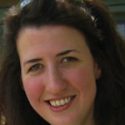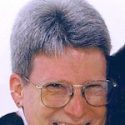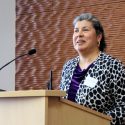Winning climate change solutions range from meat processing to mindfulness
Investors and entrepreneurs review presentations as part of Climate Quest’s competition for climate change solutions. Pictured from left to right: Ulice Payne, John Holton, Ben Ryan, Julie Van Cleave, John Nelson and Tom Olson.
The Climate Quest competition to spur innovative climate change solutions is down to a field of five.
At the Climate Quest Concept Pitch on Sept. 19, 18 teams presented their ideas to a panel of investors and entrepreneurs, who rated the ideas on many factors including creativity, scalability and potential impact.

The panel selected five teams to advance to the next round of the competition. Climate Quest is led by the UW–Madison Office of Sustainability in partnership with the Global Health Institute, Wisconsin Energy Institute, and Nelson Institute for Environmental Studies and focuses on developing practical, multidisciplinary approaches with likely society-wide impact.
“These projects are a constructive response to the dilemma we find ourselves in. Climate Quest is a way for all of us to go beyond debating whether climate change is happening or assigning blame, and moving the process forward by engaging the community in developing solutions,” says lead Climate Quest organizer Darin Harris.
***
The five final teams are:
The Dionysus Project
Team members: Bartlett Durand (lead), Michael Gurin, Sean Murdock, Russ Conser, Peter Byck, Anthony Michaels, Teresa Forst, Patrick Michaels and Geoffrey Steinback.
Additional advisers: Allen Williams, Bill Niman, Nicolette Hahn Niman, Brian Bradley, Timothy Zauche and Steve Wille.
The Dionysus Project is a re-creation of the beef industry to create a closed-loop, carbon-neutral and energy-efficient model centered on a “human-scale” slaughterhouse paired with a digester, full waste stream management, and process and energy efficiencies to dramatically reduce the carbon and energy waste typical in the industrial meat model.
EcoMotion
Team members: Keari Bell-Gawne, Jonathan Elmergreen and Dennis Ramirez.
EcoMotion is a game-styled mobile app that increases social motivation to combat climate change by encouraging individuals to make behavioral and lifestyle choices that reduce their personal carbon footprint.
Improving Global Dairy Production in the Face of Climate Change
Team members: Warren Porter (lead), Paul Mathewson and Matthew Axler.
This project will provide online and mobile access to a tool that allows users to assess climate change impact on milk production and identify environmental or livestock changes that can improve milk production under current or future climate conditions.
MIGHTi
Team members: Rachel Bergmans and Valerie Stull.
MIGHTi is exploring microlivestock farming — production of edible insects — as a means to cultivate an inexpensive and low-environmental impact nutrient source that will be sustainable in a changing climate, while simultaneously mitigating food insecurity and empowering women in developing areas such as rural Zambia.
Mindful Climate Action
Team members: Bruce Barrett (lead), Carmen Alonso, Mary Checovich, Bob Gillespie, Maggie Grabow, Cathy Middlecamp, Margaret Mooney, Evan Moss, Kristi Rietz, Leah Samson-Samuel and Julia Yates.
Additional advisers: Steve Ackerman, Richard Davidson, Mark Johnson, Ken Kushner, Sonya Newenhouse, Dave Rakel, Dick Smith and Jon Temte.
This project combines mindfulness-based stress reduction training with education on climate change, energy use and carbon footprints to create a program that will stimulate people to adopt more sustainable behaviors and lifestyles.
***
Each advancing team will receive a planning grant to produce a full proposal and proof of concept for the final Climate Quest later this year. The winners will be supported in implementing their solutions.
“Although we had to pick finalists, this is not about winners and losers,” Harris says, adding that many of the non-advancing teams are also continuing to pursue their projects. “The main point of this competition is to get people started. This was an opportunity to help nucleate ideas and launch them into potentially effective solutions.”
Videos of most of the presentations are available online for public viewing and commenting.
The review panel included:
- John Holton, chairman and president of JWS Foundation
- John Nelson, managing director and CTO of Global Infrastructure Asset Management
- Tom Olson, chief investment officer — Private Markets at UW-Foundation
- Ulice Payne, president of Addison-Clifton LLC
- Ben Ryan, senior manager of business systems and cost engineering at SunPower
- Julie Van Cleave, chief investment officer at UW-Foundation



